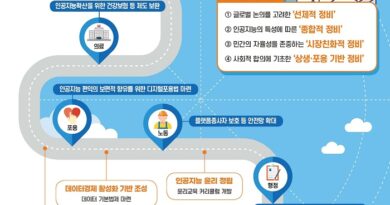2030 Arctic Ocean Expansion Plan… “Beginning the Arctic Route Development”
The Ministry of Oceans and Fisheries plans to deploy a next-generation icebreaking research vessel to the Arctic by 2030, enabling it to sail the entire Arctic Ocean.
This is expected to play a significant role in the development of the Arctic shipping route, including securing the data necessary for developing the Northern Sea Route.
The Ministry of Oceans and Fisheries announced this on the 29th, after attending the signing ceremony for the construction contract for the next-generation icebreaking research vessel between the Korea Polar Research Institute and Hanwha Ocean.

Hanwha Ocean, selected as the contracting party, received high marks in the previous technical evaluation for its optimal hull shape, superior cold-resistant performance, and research-oriented research space. This contract signing is expected to bolster Korea’s Arctic expansion.
The “Next-Generation Icebreaking Research Vessel Construction Project,” a key national project of the Ministry of Oceans and Fisheries, aims to build a world-class icebreaking research vessel by December 2029.
The next-generation icebreaking research vessel will more than double its gross tonnage and boast approximately a 50% improvement in icebreaking capability compared to the existing Araon.
Furthermore, the vessel aims to achieve the International Association of Classification Societies (IACS) Polar Class 3 classification and will utilize an eco-friendly LNG-MGO (low-sulfur fuel) dual-fuel system in line with the decarbonization era. Furthermore, the vessel will incorporate a “modular research facility” to significantly increase research space compared to existing fixed facilities.
The deployment of the next-generation icebreaker research vessel is expected to further strengthen polar scientific research capabilities by expanding the Arctic research radius, currently limited to 80 degrees north latitude, to the North Pole.
Furthermore, the existing Araon’s focus on polar research and station supply will be resolved, effectively quadrupling the available research period from the current 40 days to approximately 40 days.
Minister of Oceans and Fisheries Jeon Jae-soo explained, “The next-generation icebreaker research vessel, built using our world-class technology, will serve as infrastructure that will facilitate Arctic cooperation, including scientific research and resource cooperation.”
He added, “With the next-generation icebreaker as a starting point, we will steadily build the infrastructure and data base necessary for the sustainable use and safe navigation of the Arctic shipping route.”
[Editor Lee]







